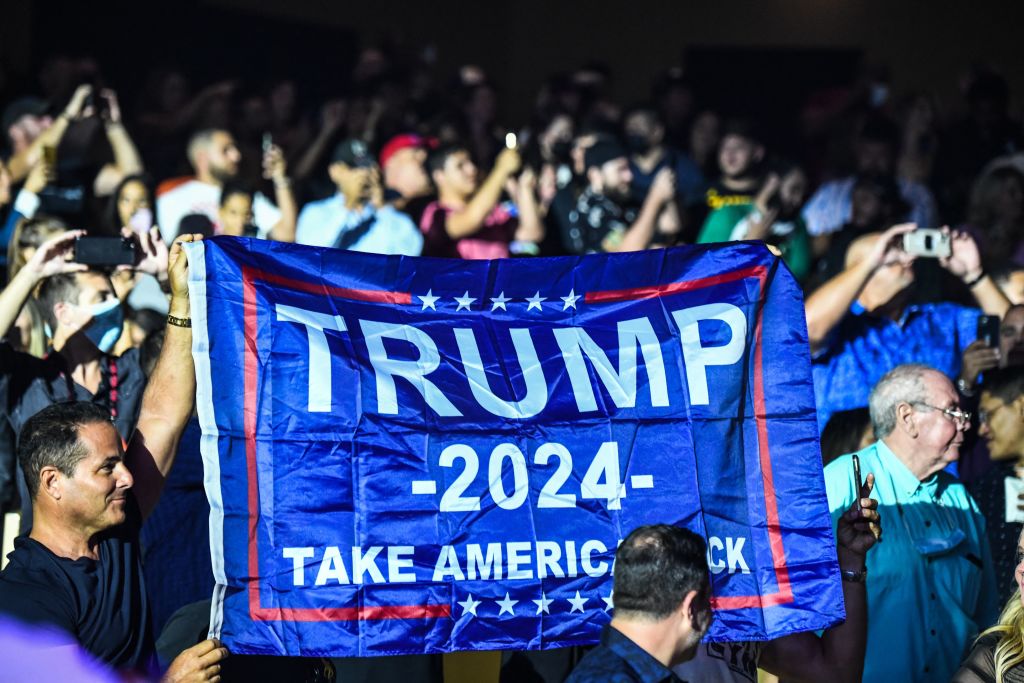The Republican factions most likely to support a Trump return in 2024


A free daily email with the biggest news stories of the day – and the best features from TheWeek.com
You are now subscribed
Your newsletter sign-up was successful
Despite the glaring partisanship that dominates much of American politics today, both Democrats and Republicans are "driven by factionalism and issue differences within their own coalitions," reports The Washington Post, per a new Pew Research Center study that divided the American electorate into nine groups — four Republican, four Democratic, and one "disparate" section.
For example, Republicans are internally divided over the role of former President Donald Trump, who they all "heavily backed" in 2020 but can't agree on where he should position himself moving forward.
More specifically, majorities in just two of Pew's four designated GOP groups — labeled the "Faith and Flag Conservatives" and the "Populist Right" — want Trump to run again. Faith and Flag Conservatives are described by Pew as "highly religious, politically engaged and both socially and economically conservative;" and 55 percent of them support a Trump 2024 run, after having largely backed him in 2020. Populist Right Republicans, however, are "very conservative on most issues but also look more skeptically at the economic system than other Republican groups, per the Post. Regardless, they are also "firmly in Trump's camp" — 57 percent believe he should take another shot at the White House.
The Week
Escape your echo chamber. Get the facts behind the news, plus analysis from multiple perspectives.

Sign up for The Week's Free Newsletters
From our morning news briefing to a weekly Good News Newsletter, get the best of The Week delivered directly to your inbox.
From our morning news briefing to a weekly Good News Newsletter, get the best of The Week delivered directly to your inbox.
The other two GOP groups — classified as the "Ambivalent Right" and "Committed Conservatives" — feel less enthusiastic about Trump. Just 21 percent of the Ambivalent Right would enjoy if the ex-president ran again, and Committed Conservatives are overall "less likely" to want Trump to take centerstage in national politics moving forward.
The typology study was mostly based on a Pew American Trends Panel survey of 10,221 adults from July 8-18. Results have a margin of error between 3.9 points and 5.4 points. See more results at The Washington Post.
A free daily email with the biggest news stories of the day – and the best features from TheWeek.com
Brigid Kennedy worked at The Week from 2021 to 2023 as a staff writer, junior editor and then story editor, with an interest in U.S. politics, the economy and the music industry.
-
 ‘States that set ambitious climate targets are already feeling the tension’
‘States that set ambitious climate targets are already feeling the tension’Instant Opinion Opinion, comment and editorials of the day
-
 Mixing up mixology: The year ahead in cocktail and bar trends
Mixing up mixology: The year ahead in cocktail and bar trendsthe week recommends It’s hojicha vs. matcha, plus a whole lot more
-
 Labor secretary’s husband barred amid assault probe
Labor secretary’s husband barred amid assault probeSpeed Read Shawn DeRemer, the husband of Labor Secretary Lori Chavez-DeRemer, has been accused of sexual assault
-
 Labor secretary’s husband barred amid assault probe
Labor secretary’s husband barred amid assault probeSpeed Read Shawn DeRemer, the husband of Labor Secretary Lori Chavez-DeRemer, has been accused of sexual assault
-
 Trump touts pledges at 1st Board of Peace meeting
Trump touts pledges at 1st Board of Peace meetingSpeed Read At the inaugural meeting, the president announced nine countries have agreed to pledge a combined $7 billion for a Gaza relief package
-
 Why are election experts taking Trump’s midterm threats seriously?
Why are election experts taking Trump’s midterm threats seriously?IN THE SPOTLIGHT As the president muses about polling place deployments and a centralized electoral system aimed at one-party control, lawmakers are taking this administration at its word
-
 NIH director Bhattacharya tapped as acting CDC head
NIH director Bhattacharya tapped as acting CDC headSpeed Read Jay Bhattacharya, a critic of the CDC’s Covid-19 response, will now lead the Centers for Disease Control and Prevention
-
 Witkoff and Kushner tackle Ukraine, Iran in Geneva
Witkoff and Kushner tackle Ukraine, Iran in GenevaSpeed Read Steve Witkoff and Jared Kushner held negotiations aimed at securing a nuclear deal with Iran and an end to Russia’s war in Ukraine
-
 Pentagon spokesperson forced out as DHS’s resigns
Pentagon spokesperson forced out as DHS’s resignsSpeed Read Senior military adviser Col. David Butler was fired by Pete Hegseth and Homeland Security spokesperson Tricia McLaughlin is resigning
-
 Judge orders Washington slavery exhibit restored
Judge orders Washington slavery exhibit restoredSpeed Read The Trump administration took down displays about slavery at the President’s House Site in Philadelphia
-
 Hyatt chair joins growing list of Epstein files losers
Hyatt chair joins growing list of Epstein files losersSpeed Read Thomas Pritzker stepped down as executive chair of the Hyatt Hotels Corporation over his ties with Jeffrey Epstein and Ghislaine Maxwell
